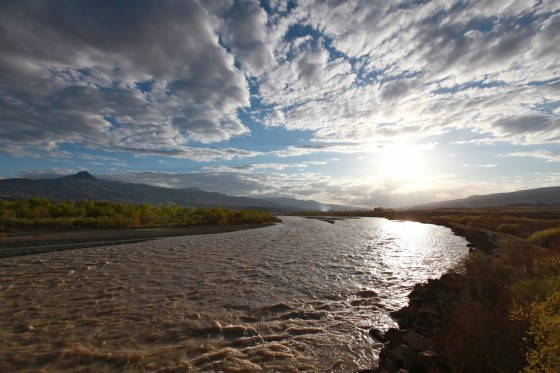 The Aras River basin is home to more than half of Turkey’s bird species, but a planned hydroelectric dam would alter the river’s marshy ecosystem, driving away the birds.
The Aras River basin is home to more than half of Turkey’s bird species, but a planned hydroelectric dam would alter the river’s marshy ecosystem, driving away the birds.
That’s the fear of Çağan Şekercioğlu, president and founder of Turkey’s KuzeyDoğa wildlife preservation NGO. Green Prophet has written about Şekercioğlu’s groundbreaking research, teaching, and conservation work before. Now, he is trying to prevent a dam from destroying one of the richest habitats in Eastern Anatolia, according to the Turkish environmental website Yeşil Gazete (in Turkish).
What’s at stake
Each year, millions of birds pass through the Aras River basin, which is a major stop on the main avian migration route between Africa and the Eurasian countries.
Of Turkey’s 469 bird species, 240 dwell in and around the river where it passes through Turkey’s Iğdır Province, in the northeast of the country. The Aras Bird Research and Education Center was founded six years ago to study, nurture, and protect this extraordinary avian habitat.
Despite the efforts of Şekercioğlu and his conservationist comrades, however, the site has not been designated a “Marsh Site” or given the protected status it would need to block major construction projects from being carried out in the area.
If the area is flooded, as would happen if the proposed hydroelectric dam is built, “an area containing hundreds of bird species and thousands of individual lives will be obliterated,” warns Şekercioğlu.
The threat
The Tuzluca Dam is one in a series of environmentally destructive hydroelectric projects that the Turkish government has been promoting in an effort to boost its domestic energy supply. A few months ago, the Turkish cabinet even invoked a wartime law to expedite the seizure of land for hydroelectric power plants.
Aras Valley has already suffered from similar dams that have been built nearby. The dams erode the riverbed, spreading the displaced sand and gravel around the surrounding area and “spoiling the ecosystem a little more with each passing day,” according to Şekercioğlu.
In a country with more widespread appreciation for nature conservation and the importance of biodiversity, Şekercioğlu would be more likely to save the precious river basin. But in Turkey, the government is most focused on economic advancement and energy independence, shielding the public from the environmental consequences of the developments it pursues.
The Aras River basin will be an important test in the Turkish government’s willingness to preserve its truly precious treasures as it races to satisfy a growing national hunger for energy.
:: Yeşil Gazete
Read more about the clash between hydropower and conservation in Turkey:
In Remotest Anatolia, Lone NGO Speaks Up On Nature’s Behalf
Turkish Cabinet Invokes Wartime Law To Seize Property For Hydro Projects
Turkey’s Early Hydroelectric Dams Featured In Exhibit
Hydroelectric Dam In Turkey May Cause Environmental Catastrophe In Georgia
Turkish Water Projects Stirring Resentment Around the Region
Image via Alexander Christie-Miller for Mashallah News



